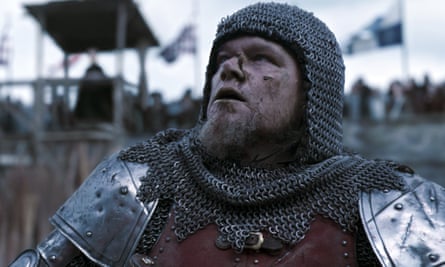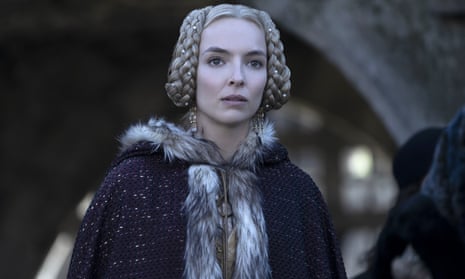Here is a bizarre rape-revenge parable where the rapists get to do the revenging, based on a true story and set in a 14th-century society of bluebloods infatuated with their own reputation for gallantry, nobility and courtly love. It is co-written by Nicole Holofcener, Matt Damon and Ben Affleck and directed by Ridley Scott at a full-tilt gallop, with the same muscular force as his great crowd-pleaser Gladiator. At its premiere at the Venice film festival last month, The Last Duel was coolly received by critics, perhaps uneasy at this theme being tackled by alpha male stars. But though flawed, its old-fashioned movie-making energy commands attention as well as its ingenious, if overextended three-act Rashomon structure, retelling the same story from three different standpoints, mostly without insisting on tricksy discrepancies.
This is a story of rape that does not instantly extend to the complainant the #MeToo prerogative of victim-belief, giving us the story as told by the victim’s husband, the culprit and finally the victim herself in a he-said-he-said-she-said format. But a trick with the intertitles makes it clear which story is the truth. It is based on medieval literature specialist Eric Jager’s bestseller The Last Duel: A True Story of Trial By Combat in Medieval France, which recounted how, in 1386, the Norman knight Jean de Carrouges demanded of King Charles VI the right to a fight-to-the-death with a certain Jacques Le Gris, with whom he was already in bitter dispute over a matter of land ownership and military preferment, and who he now accused of raping his wife, Marguerite.
Damon gives a very good performance (actually, one of the best of his career) as the pompous, chippy and defensive Carrouges. His star is waning at court and he is enviously obsessed with the success of his frenemy and fellow soldier Le Gris, a preening, self-assured careerist and libertine played with feline style by Adam Driver. Le Gris wheedles his way into the good graces of the ruling Count Pierre d’Alençon, himself a giggling womaniser played with blond hair (never a good sign) by Affleck. The king is portrayed in a similar vein by Alex Lawther. Carrouges’ happiness should be assured when he is knighted on the battlefield and marries the beautiful Marguerite de Thibouville, played by Jodie Comer. But his failure to get his wife pregnant, along with his rancorous attitude, causes nothing but bitterness and resentment. Then he returns from an ill-tempered visit to the Parisian court to be told by his wife, blazing with rage and hurt, that Le Gris has raped her.

From Carrouges’ standpoint, the event is eerily absent; from Marguerite’s it is an ugly and violent act of hate. But Le Gris’s view of things is truly insidious and contemptible: after the accusation is made public, Driver’s Le Gris is solemn with self-pity, assuring D’Alençon that of course the lady made chaste protestations because that was what was expected of her. The scene itself, as played from inside Le Gris’s head, is a chilling affair of worldly self-forgiveness and delusion: the medieval equivalent of blurred lines. The odious D’Alençon assures his favourite that the public would not understand such “nuance” and urges him to take the nauseatingly familiar-sounding defence: “Deny, deny, deny.” And after the event, Marguerite’s husband angrily redoubles the ordeal in a horrendous, punitive demonstration of his male privilege.
The flaw is that, though Comer gives the role her considerable best, the drama is centred on the men; the tripartite structure means Marguerite can only get one third of our attention – not even the 50% that she might otherwise receive in the court of patriarchal public opinion. The writing and direction are focused elsewhere, although there is no doubt as to how nauseating these male characters are. Even so, it is a forthright picture with storytelling gusto.
